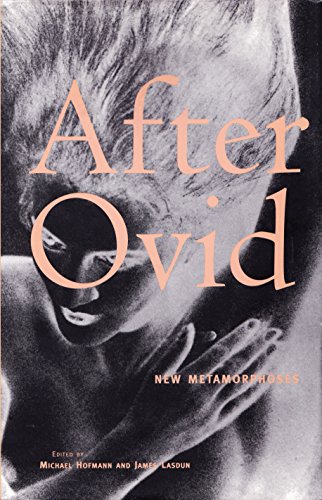Ovid's Metamorphoses is one of the great works in classical literature, and a primary source for our knowledge of much of classic mythology, in which the relentless theme of transformation stands as a primary metaphor for the often cataclysmic dynamics of life itself. The British poets Michael Hofmann and James Lasdun have invited more than forty leading English-language poets to create their own idiomatic contemporary versions of some of the most famous and notorious stories from the Metamorphoses. Apollo and Daphne, Pyramus and Thisbe, Proserpina, Marsyas, Medea, Baucis and Philemon, Orpheus and Eurydice - these and many other deathless myths are brought to startling, fresh life in exciting new versions. The contributors - among them Fleur Adcock, Amy Clampitt, Thom Gunn, Seamus Heaney, Ted Hughes, Lawrence Joseph, Kenneth Koch, Michael Longley, Paul Muldoon, Les Murray, Robert Pinsky, Frederick Seidel, Charles Simic, and C. K. Williams - constitute an impressive roster of major makers of poetry in our language. After Ovid is thus both a powerful reenvisioning of a fundamental work of literature and a remarkable sounding of the state of poetry in English now.
"[This anthology aims] to play fast and loose with Ovid's text and themes just as he played fast and loose with the old myths. "After Ovid" is racy, memorable, and vividly contemporary. The themes are most certainly ours: sex-change, multiple rape, cross-dressing, the random cruelties of war. The poets re-imagine, reflect on, and generally reinterpret the originals--something of which Ovid himself would surely have approved. Reading Ovid in these versions, and even in the original, is a bit like a good evening at the cinema: rapid scene changes; sudden close-ups; unexpected shifts of attention."--"The Economist"
"The old magic has worked anew and several major figures have obviously found themselves hooked. . . . The contributors' list is a roll-call of remarkable distinction. . . . The effect is to bring Ovid from a dead to a living language."--"The New Statesman & Society"
[This anthology aims] to play fast and loose with Ovid's text and themes just as he played fast and loose with the old myths. "After Ovid" is racy, memorable, and vividly contemporary. The themes are most certainly ours: sex-change, multiple rape, cross-dressing, the random cruelties of war. The poets re-imagine, reflect on, and generally reinterpret the originals--something of which Ovid himself would surely have approved. Reading Ovid in these versions, and even in the original, is a bit like a good evening at the cinema: rapid scene changes; sudden close-ups; unexpected shifts of attention. "The Economist"
The old magic has worked anew and several major figures have obviously found themselves hooked. . . . The contributors' list is a roll-call of remarkable distinction. . . . The effect is to bring Ovid from a dead to a living language. "The New Statesman & Society""
"[This anthology aims] to play fast and loose with Ovid's text and themes just as he played fast and loose with the old myths. After Ovid is racy, memorable, and vividly contemporary. The themes are most certainly ours: sex-change, multiple rape, cross-dressing, the random cruelties of war. The poets re-imagine, reflect on, and generally reinterpret the originals--something of which Ovid himself would surely have approved. Reading Ovid in these versions, and even in the original, is a bit like a good evening at the cinema: rapid scene changes; sudden close-ups; unexpected shifts of attention." --The Economist
"The old magic has worked anew and several major figures have obviously found themselves hooked. . . . The contributors' list is a roll-call of remarkable distinction. . . . The effect is to bring Ovid from a dead to a living language." --The New Statesman & Society
